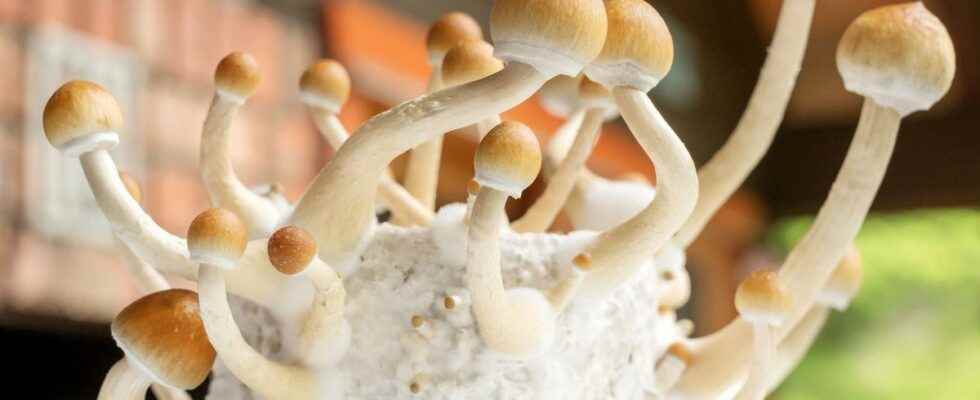Published on
Updated
Reading 3 mins.
For several years, scientists have been looking more and more seriously at the therapeutic effect of psychedelics, substances that are often prohibited. However, despite this renewed interest, large-scale studies are still lacking.
It is estimated that nearly 100 million people worldwide suffer from treatment-resistant depression. Psychedelics represent a lead to help them. Explanations.
A psychedelic treatment to reduce the effects of depression?
Last Wednesday, researchers took an important step to fill that void. Their work, published in the scientific journal NEJMconstitute the largest clinical trial ever conducted to assess the effect of psilocybin, a psychoactive substance naturally present in hallucinogenic mushrooms.
A single dose of 25 milligrams reduced symptoms of depression in people for whom several conventional treatments had failed, they showed. The researchers here tested a synthetic version of psilocybin developed by the start-up Compass Pathway, which also funded these trials.
A total of 233 people in 10 countries took part – after having stopped any ongoing treatment, while following psychological support. They were divided into three groups randomly receiving 1 mg, 10 mg or 25 mg of the treatment.
The sessions, in a dedicated room, lasted between six and eight hours during which the participants were never left alone. Some described being immersed in “a state comparable to a dream” which we could remember, explained during a press conference James Rucker, co-author of the study.
One participant required the administration of a sedative during the session, due to anxiety. But the side effects observed (headaches, nausea, anxiety…) were generally moderate and disappeared quickly.
Uncertain effectiveness over time…
Three weeks later, patients who received 25 mg showed significant improvement in their condition compared to the lower doses, according to a baseline measure for depression. Just under 30% of them were in remission.
“This is the strongest evidence yet that larger, longer trials evaluating psychedelics are warranted, and that psilocybin could (one day) provide a potential alternative to decades-prescribed antidepressants.”commented Andrew MacIntosh, professor of psychiatry at the University of Edinburgh, not involved in the study.
These so-called phase 2 trials were intended to determine the dosage and confirm the existence of an appropriate effect.
Phase 3 trials, on more participants, should begin this year and extend until 2025. The start-up is already in contact with the American Medicines Agency (FDA) and other regulators in Europe.
Suicide: one of the side effects of treatment
But “we don’t yet know enough about the potential side effects, especially if some people might see their symptoms worsen”nuanced Anthony Cleare, professor of psychopharmacology in London, who did not participate in the study.
In the trials, three participants exhibited suicidal behavior among those given 25 mg, compared to none in the other groups.
These events, however, took place more than 28 days after treatment, pointed out Guy Goodwin, professor of psychiatry at Oxford and manager at Compass Pathways. “Our hypothesis is that this difference is due to chance, (…) but we will only be able to find out by doing more experiments”, did he declare.
The question of the long-term effect also remains unanswered, as it faded during the follow-up of the participants three months later. Repeat doses may be required. Two doses will be tested in the next trials, said Guy Goodwin.
Psilocybin: studied a use for other pathologies?
Taking psilocybin leads to a spike in dopamine (known to regulate mood) and another neurotransmitter that may promote brain plasticity, James Rucker explained.
“When the brain is in a state of greater flexibility, it opens up what is considered to be a window of therapeutic opportunity which, in the context of medical monitoring and psychotherapy, can help bring about changes positive in people”he said.
Psilocybin promotes “more communication between brain regions”, added Nadav Liam Modlin, also a co-author of the study. It – which is not addictive – is also studied for other pathologies: post-traumatic stress, anorexia, anxiety, addictions…
In 2020, the State of Oregon voted in favor of the therapeutic use of psilocybin. For example, exemptions have also been granted in Canada. But this underlying trend is also sometimes coupled with the promotion of the pure and simple legalization of hallucinogens, noted Bertha Madras, professor of psychology at Harvard, in an editorial also published by NEJM. Of the “shops or [cliniques] psychedelics could then proliferate, also for vulnerable populations”she warned.
